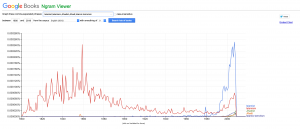Difference between revisions of "Islamist-Islamism"
(→Bernard Lewis) |
(→History of usage) |
||
| Line 10: | Line 10: | ||
On of the earliest articles of note was by [[Bernard Lewis]] a 'renowned British-American historian of Islam and the Middle East. A former British intelligence officer, Foreign Office staffer, and Princeton University professor, Lewis was the author of some three-dozen books about the Middle East.'<ref>Militarist Monitor, [https://militarist-monitor.org/profile/bernard-lewis/ Bernard Lewis], last updated: September 17, 2018.</ref> | On of the earliest articles of note was by [[Bernard Lewis]] a 'renowned British-American historian of Islam and the Middle East. A former British intelligence officer, Foreign Office staffer, and Princeton University professor, Lewis was the author of some three-dozen books about the Middle East.'<ref>Militarist Monitor, [https://militarist-monitor.org/profile/bernard-lewis/ Bernard Lewis], last updated: September 17, 2018.</ref> | ||
| − | In January 1976 he published a piece in the Zionist/Neoconservative magazine ''[[Commentary]]'', which at that stage was still published by the [[American Jewish Committee]]. Titled 'The return of Islam' it raised the spectre of 'new forms of pan-Islamic activity.'<ref name="Lewis">Lewis, Bernard, “[https://www.commentarymagazine.com/articles/the-return-of-islam/ The Return of Islam].” ''Commentary'' 61, no. 1 (1976): 39–49.</ref> | + | In January 1976 he published a piece in the Zionist/Neoconservative magazine ''[[Commentary]]'', which at that stage was still published by the [[American Jewish Committee]]. Titled 'The return of Islam' it raised the spectre of 'new forms of pan-Islamic activity.'<ref name="Lewis">Lewis, Bernard, “[https://www.commentarymagazine.com/articles/the-return-of-islam/ The Return of Islam].” ''Commentary'' 61, no. 1 (1976): 39–49.</ref> It sets out to insist that the problem with Islam is that it is a religion. Thus he chides the West for not understanding that Muslims are not like us. 'We are prepared' he states 'to allow religiously defined conflicts to accredited eccentrics like the Northern Irish, but to admit that an entire civilization can have religion as its primary loyalty is too much.'<ref name="Lewis"/> |
===Martin Kramer=== | ===Martin Kramer=== | ||
Revision as of 22:21, 13 February 2020
Islamism (and the associated Islamist) are terms that are used very widely in contemporary discourse.
Contents
History of usage
The term Islamism historically referred to adherents of Islam. It was a term used widely in English from as early as 1800, peaking in books published in English around 1860 and declining to residual use by the turn of the century. Its occurrence only picked up, as the Google Ngram image shows, but this time in a mostly new sense, at the end of the 1980s.
What caused the reinvention and reinterpretation of the term Islamism (and around the same time, the coining of a new term to go with it - Islamist)?
Bernard Lewis
On of the earliest articles of note was by Bernard Lewis a 'renowned British-American historian of Islam and the Middle East. A former British intelligence officer, Foreign Office staffer, and Princeton University professor, Lewis was the author of some three-dozen books about the Middle East.'[1]
In January 1976 he published a piece in the Zionist/Neoconservative magazine Commentary, which at that stage was still published by the American Jewish Committee. Titled 'The return of Islam' it raised the spectre of 'new forms of pan-Islamic activity.'[2] It sets out to insist that the problem with Islam is that it is a religion. Thus he chides the West for not understanding that Muslims are not like us. 'We are prepared' he states 'to allow religiously defined conflicts to accredited eccentrics like the Northern Irish, but to admit that an entire civilization can have religion as its primary loyalty is too much.'[2]
Martin Kramer

Four years later Martin Kramer - both student and friend of Lewis - introduced the term 'Political Islam':
- Terminology for the phenomena characterized as Political Islam varies among scholars. The first scholar to introduce the term Political Islam was Martin Kramer in 1980. Some scholars use the term Islamism for the same set of phenomena, or use the two terms interchangeably. Dekmejian 1980 was among the first to place the politicization of Islam in the context of the failures of secular governments, although he uses the terms Islamism and fundamentalism (rather than Political Islam) interchangeably. Dekmejian 1995, still using fundamentalism and Islamism, is an influential treatment of Political Islam as increasingly mainstream and moderate. Some scholars, using descriptive terms such as conservative, progressive, militant, radical, or jihadist, distinguish among ideological strains of Political Islam.[3]
Kramer's book was published by Sage but in a series called the 'Washington Papers'. This was edited by Walter Laqueur the historian, journalist, propagandist and 'terror expert' who was at the time attached to the Georgetown University think tank the Center for Strategic and International Studies. The book only used the term 'Islamism' on four occasions, in each case with the prefix 'Pan' as in 'Pan-Islamism'. the idea that Muslims involved in politics might all be part of the same phenomenon seems to have been an intoxicating one.
Gilles Kepel and Olivier Roy
Resources
- Dekmejian, R. Hrair. “The Anatomy of Islamic Revival: Legitimacy Crisis, Ethnic Conflict and the Search for Islamic Alternatives.” The Middle East Journal 34, no. 1 (1980): 1–12.
- Krieg, Andreas Laying the ‘Islamist’ bogeyman to rest Lobelog, October 10, 2019
- Lewis, Bernard, “The Return of Islam.” Commentary 61, no. 1 (1976): 39–49.
- Sayyid, Salman, (2015). A fundamental fear: Eurocentrism and the emergence of Islamism. Zed Books Ltd.
- Scardino, Albert, 1-0 in the propaganda war The guardian, 4 February 2005.
- Smith, Blake, Why We Say ‘Islamism’ and Why We Should Stop, Quillette. 11 February 2018
Notes
- ↑ Militarist Monitor, Bernard Lewis, last updated: September 17, 2018.
- ↑ 2.0 2.1 Lewis, Bernard, “The Return of Islam.” Commentary 61, no. 1 (1976): 39–49.
- ↑ John O. Voll, Tamara Sonn Political Islam Oxford Bibliographies, LAST REVIEWED: 29 SEPTEMBER 2014, LAST MODIFIED: 14 DECEMBER 2009 DOI: 10.1093/OBO/9780195390155-0063.
